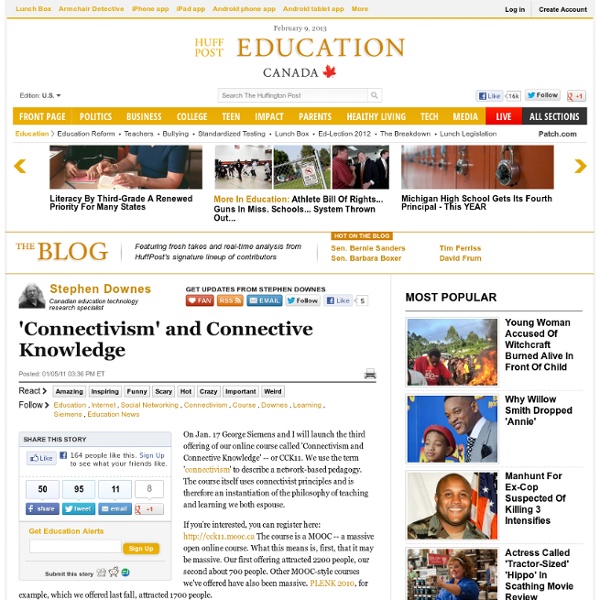Connectivism: Its place in theory-informed research and innovation in technology-enabled learning | Bell
Special Issue - Connectivism: Design and Delivery of Social Networked Learning Frances Bell University of Salford, United Kingdom Abstract The sociotechnical context for learning and education is dynamic and makes great demands on those trying to seize the opportunities presented by emerging technologies. Keywords: Theory; learning; implementation; research; evaluation; connectivism; actor-network theory; social shaping of technology; activity theory; zone of proximal development; change management Those who struggle to create an adequate theory of learning must admit that the process is much like stumbling in the dark. Introduction From its origins as a network for sharing data and software amongst scientists, the Internet has become commonplace in the developed world and is growing rapidly in developing countries, as shown in Table 1 (Internet Usage Statistics, 2009). Connectivism as a Learning Theory Connectivism Connectivism as a Phenomenon
About gRSShopper ~ gRSShopper
You are not logged in. [] [] gRSShopper is a personal web environment that combines resource aggregation, a personal dataspace, and personal publishing. It allows you to organize your online content any way you want to, to import content - your own or others' - from remote sites, to remix and repurpose it, and to distribute it as RSS, web pages, JSON data, or RSS feeds. gRSShopper incorporates a number of distinct data types. For example, the gRSShopper harvester will harvest a link from a given feed. Content in gRSShopper is created and manipulated through the use of system code that allows administrators to harvest, map, and display data, as well as to link to and create their own content. gRSShopper is also intended to act as a fully-fledged publishing tool.
Learning Networks and Connective Knowledge
Learning Networks and Connective Knowledge Stephen Downes October 16, 2006 I have a lot of mixed feelings about this paper but it is an honest and reasonably thorough outline of my views. The purpose of this paper is to outline some of the thinking behind new e-learning technology, including e-portfolios and personal learning environments. Parts of this paper are drawn from previous papers (especially Connective Knowledge and Basics of Instructional Design, neither of which are published). The Traditional Theory: Cognitivism The dominant theory of online and distance learning may be characterized as conforming to a ‘cognitivist’ theory of knowledge and learning. In other words, cognitivists defend an approach that may be called ‘folk psychology’. One branch of folk psychology, the language of thought theory, holds that things like beliefs are literally sentences in the brain, and that the materials for such sentences are innate. Again, though, notice the pattern here.
The Future of Learning in a Networked Society
“This is the first generation of people that work, play, think, and learn differently than their parents … They are the first generation to not be afraid of technology. It’s like air to them.” – Don Tapscott This powerful video has some of the worlds best educators and thinkers outlining their view on the ‘future of learning in a networked society’, including the likes of Stephen Heppell, Sugata Mitra, and Seth Godin: YouTube: The Future of Learning, Networked Society Again, here are a few choice quotes that I like from the video, but watch it yourself for their context and many more I didn’t have time to write down: “We are probably at the death of education right now. Thank you to Grianne Conole for tweeting this earlier today.
Jan05_01
Editor’s Note: This is a milestone article that deserves careful study. Connectivism should not be con fused with constructivism. George Siemens advances a theory of learning that is consistent with the needs of the twenty first century. His theory takes into account trends in learning, the use of technology and networks, and the diminishing half-life of knowledge. It combines relevant elements of many learning theories, social structures, and technology to create a powerful theoretical construct for learning in the digital age. George Siemens Introduction Behaviorism, cognitivism, and constructivism are the three broad learning theories most often utilized in the creation of instructional environments. Learners as little as forty years ago would complete the required schooling and enter a career that would often last a lifetime. “One of the most persuasive factors is the shrinking half-life of knowledge. Some significant trends in learning: Background An Alternative Theory Connectivism



